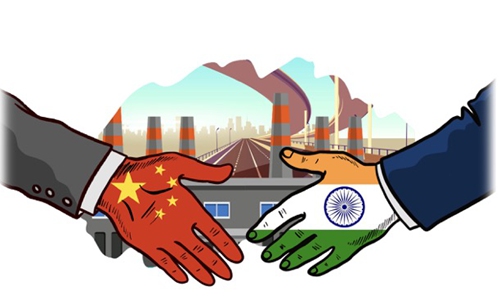
(Photo: GT)
India on Saturday adopted harsh measures barring foreigners who have been to China since January 15 from entering the country via air, land or sea, according to a report by the Times of India.
Unlike the US, which has overreacted and made its decision based largely on political considerations, India's border control decision came weeks after the beginning of the novel coronavirus pneumonia (NCP) outbreak and was a prudent and feasible one based on the country's situation.
India confirmed its third case of NCP last week. With a high population density and complex sanitation issues, it could be difficult for the country to contain the spread of NCP.
China fully understands India's decision and its efforts to control the spread of NCP. The Chinese government and Chinese people have been making great efforts to combat the NCP outbreak. These efforts have gradually started to show effects. After this critical stage, it is believed that China will reverse its current situation and win the battle against NCP. It is hoped that India will be able to see China's efforts and changes.
This year is an important one for China-India economic ties. Before the NCP outbreak, many Chinese companies had been considering further expanding their investments in India. The ongoing Auto Expo 2020, India's largest auto show, has attracted Chinese automakers who are gearing up for an even stronger entry into the Indian auto market. Great Wall Motors reportedly plans to invest in the establishment of a manufacturing unit in India.
India, on the other hand, is seeking to enlarge its exports to China, bringing down its trade deficit. At the same time, closer economic and trade connections can be welded between the two countries.
However, the unexpected epidemic outbreak has interrupted such plans. Indian carmakers have already suffered some impact as the virus has interrupted the country's supply of certain components and materials produced in China.
Apart from trade, what is worrying is that investment from China may shrink. India is in need of Chinese investment, particularly as its economy has had a turbulent year. India's ambitious "Make in India" initiative to bolster its manufacturing industry could surely use Chinese investment.
China became the second-largest foreign investor globally in 2018. Chinese companies invested $3.9 billion into Indian start-ups in 2019, almost double the amount from 2018. And Chinese automakers have generated tens of millions of jobs in India. It is hoped that India can support business exchanges between the two countries to keep Chinese investment flowing in despite virus prevention measures. Indian partners should be encouraged to offer Chinese investors lenient terms for potential delays caused by NCP.
Containing the spread of the virus is certainly the priority, but China and India should work together to reduce the damage to bilateral economic and trade cooperation. In the current context, the two countries ought to enhance communication and launch necessary measures to restore normal trade and investment activities. That is important to India, and it is important to China.


